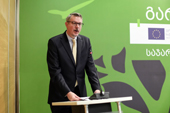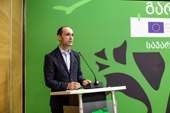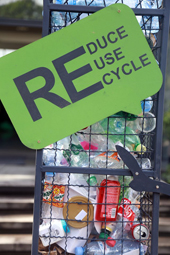EU and Government Host Large Scale Public Forum on Environment in Tbilisi
Tuesday, May 7



The Public Forum was organized in cooperation with the Ministry of Environmental Protection and Agriculture of Georgia, the Solid Waste Management Company of Georgia, the Tbilisi City Hall and the organization “Georgia’s Environmental Outlook- GEO”.
The Public Forum provided a platform for over 400 representatives of the general public, youth, civil society, local and international experts, international organizations, media, and other stakeholders to engage in discussions on waste management related issues in Georgia. Challenges induced by improper waste management in Georgia, as well as achievements and reforms carried out in the field of waste management, were the main topics discussed at depth by the representatives of respective governmental institutions and local experts. Participants of the Public Forum also had an opportunity to familiarize themselves with international practices in waste management and circular economy.
Among the key speakers of the Public Forum were: H.E. Carl Hartzell, Ambassador of the European Union to Georgia, Mr. Levan Davitashvili, Minister of Environmental Protection and Agriculture of Georgia, Mr. Kakha Kuchava, Chairman of the Parliamentary Committee of Environment Protection and Natural resources of Georgia, Ms. Khatia Tsilosani, Deputy Minister of Environmental Protection and Agriculture of Georgia, Mr. George Shukhoshvili, Director, Solid Waste Management Company of Georgia, Mr. Maayke Damen, International Expert, Ms. Khatuna Gogaladze, Environmental Policy Expert, Ms.Nino Tevzadze, CENN.
“The EU is a global leader in environmental protection, and I am happy to see that environmental and health concerns are rapidly rising on the public agenda here in Georgia. For these reasons, the EU is proud to host today’s Forum in Tbilisi where we want to give people a chance to discuss more about these issues and contribute to the public discussion. We are impressed with the huge interest and happy to have key partners such as the Government, Parliament and civil society involved. We look forward to continue our work in supporting Georgia deal with these crucial issues going forward” noted Ambassador Hartzell.
“Coordinated actions and common understanding of waste management among key stakeholders, including the general public, as well as a proper understanding of their roles and public ownership are instrumental for achieving success in this sector.” Said Levan Davitashvili, the Minister of Environmental Protection and Agriculture of Georgia. “It is therefore, of utmost importance that general public and other relevant stakeholders are aware of the current situation, trends and planned activities in the field of waste management and are actively engaged in the process”
Ambassador Hartzell used the Public Forum to launch a social media challenge on waste minimization, noting: “Reducing waste is something that we can all do – through this challenge, I hope to can get this message out!”
The event was initiated in a view of recent findings of the National Democratic Institute (NDI), which found that environment tops the list of the most important local issues. In particular, Georgian citizens are most concerned about: air pollution (57 percent), food safety (44 percent), and the presence of hazardous materials and toxins in products (40 percent). According to the poll, residents of Tbilisi identify environmental pollution as the number one issue.
Every year, Georgia generates around 900 000 tons -3.42 million m3 of household wastes waste, which is up to 600 kg per inhabitant. This waste contains up to 1000 non-hazardous and hazardous substances which pose a threat to human health and the environment.
Uncontrolled disposal of waste:
• pollutes the air, water, and soils;
• damages ecosystems and biodiversity;
• contributes to the pollution of food;
• contributes to the spread of infectious diseases.
Waste collection, safe disposal, recycling, recovery and waste management, in general, are top priorities for the government of Georgia. There was not any consistent legal basis for the establishment of a proper waste management system in Georgia until 2015 when a new Waste Code entered into force. The Code is the framework legal act regulating all activities related to the management, treatment, and disposal of the waste (including hazardous waste). It enacts a number of principles/requirements and imposes a burden on both the waste generators and waste facility operators. Some requirements have already been in force, while others are expected to be enacted step by step as defined by the Code.
Within last years a number of measures have been undertaken in the country with the aim of implementing legislation and relevant policy documents and establishing a comprehensive system for waste management in line with modern standards and the EU-Georgia Association Agreement (AA) requirements. There are 2 basic legal acts outlined in the AA which define the framework of the obligations of Georgia, namely the Waste Framework Directive and the Landfill Directive.
